RDM Archives
Q3 2006
iPhone RSS Version
Free iTunes Links
iTunes RSS Feeds
Other iTunes Content
Netflix
Poor Microsoft! Its abandonment of PlaysForSure partners and other strategies related to its solo iPod killer efforts have been mercilessly attacked before the company can even get the new device into the hands of users.
On top of that, it's also facing stiff competition in pricing. However, according to proponents of Ten iPod vs Zune Myths, the Zune is technically superior, with brilliant wireless sharing features, and will be able to compete with Apple’s iPod as a cheap loss leader. Ahem. They're wrong, here's why.
When Apple uncharacteristically showed an early preview of its tentatively named iTV set top box, analysts of all stripes jumped to share their take on what the box is, what it will be able to do, and how it might change the landscape of TV.
The Case of the Missing DVR looked at why Apple isn’t positioning the iTV as another Tivo. Here's a second look at the more entertaining bits of rampant iTV speculation, this time looking at USB and what lurks inside.

Apple’s iTV & The Case of the Missing DVR
When Apple uncharacteristically showed an early preview of its tentatively named iTV set top box, analysts of all stripes jumped to share their take on what the box is, what it will be able to do, and how it might change the landscape of TV. Here's part one of the more entertaining bits of rampant speculation, which asked: Where's the DVR?

The first half of the iTunes Monoploy/Failure Myth debunked the Monopoly Myth by demonstrating how Apple contends in a competitive market for both music players and digital downloads. Here, I'll take apart the other half of the myth by showing that not only is Apple's online strategy a success, but also why and how Apple has maintained its lead while rivals have failed miserably.

In Greenpeace Apologizes For Apple Stink, I reported on Toxic Chemicals in Your Laptop Exposed, a new report which labored to find any trace of chemicals, toxic or not. The report not only wholly contradicted the group's earlier Guide to Greener Electronics, but its sensationalist press release also contradicted the data in the report itself! Why is Greenpeace shooting in such random directions?

The iTunes Monopoly/Failure Myth
According to proponents of this myth, Apple's iTunes Store has a monopolistic lock on digital music, and at the same time is also a marginal failure that nobody is using. Judging from headlines that appear next to each other, it's hard to keep the FUD straight. In both cases, they're wrong, here's why.

All the News that's Fit to Digg
One of today's fastest growing web sites is not only making news and content easier to find, but also helping to demand more from companies, organizations, governments and analysts, in the form of better products and more accountability for promises and reporting. It's Digg.com, and it represents a significant potential alternative to corporate-filtered news sites and commercially syndicated programming.

Greenpeace Apologizes For Apple Stink
Just over two weeks ago, I published the critique Top Secret: Greenpeace Report Misleading and Incompetent, where I examined the accuracy and usefulness of the “Greenpeace Guide to Greener Electronics,” as well as its accompanying press release spin that bent over backward to attack Apple on its environmental record.
Here’s an expensive apology and the somewhat ineffectual rebuttal I received from Greenpeace International which concedes that my original exposé was right on the money.

10 Ways Microsoft Can Salvage their iPod Killer
Dear Microsoft: I can't help but noticing that this latest iPod killer situation is unfolding along the same lines as Origami. It's not too late to call the whole thing a ‘market research experiment,’ or to rebrand all your products under a new name to distract attention away from this boondoggle: Active-, Direct-, -.net, -Live!... how about -Kaboom! ?

Hacking iPod Games: How Apple's DRM Works
I took a first look at the new iPod games in Apple's New Dual Processor Game Console. Here's a look at some of the quirks and the hack potential of the new games and the iPod, and why iTunes is where all the action is.

iTV: the Killer App for Wireless N
I got some criticism for writing in How Apple's iTV Media Strategy Works that I thought Apple's new iTV was going to incorporate 802.11n, the new and much faster industry standard for wireless networking. Some readers thought that n isn't going to be ready in the timeframe Apple announced for iTV's arrival, while others said 802.11g is plenty fast enough to stream video already.
Apple's New Dual Processor Game Console
This week, Apple unveiled a new dual processor, handheld gaming platform with stereo surround sound and a bright, 30 frames per second color display. The company also announced that it created an instant installed base of players by secretly distributing millions of the new devices over the last year.
This brand new platform is the fifth generation iPod. With a simple software upgrade, it can now play a new generation of games Apple is selling in directly from iTunes. Its dual processors have simply been playing music and videos up to this point. Now they’re chomping at the bit to dive into games apparently. Who knew?
How Apple's iTV Media Strategy Works
Apple's surprise announcement of a $299 “iTV” set top box was a confusion for some because Apple didn't call it what it really is: the Video Airport Express. Here's a closer look at the new device, and how it fits in with Apple’s online media strategy.

A Visual Comparison of CD, DVD, HD and iTMS
As noted in Why Apple is Winning in Media Downloads, there's a huge gulf between HD or even DVD quality video, and what can be effectively delivered over the web. Here’s a visual comparison of how much larger HD and DVD programming is, compared to what Apple is selling in the iTMS.
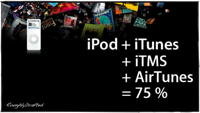
Why Apple is Winning in Media Downloads
Apple is leading media download sales by a huge margin, and had sustained its lead for several years now. The company didn't fall into first place by accident however.
Apple's lead is based on platform principles that are very similar to the ones that made Microsoft successful with Windows: an understanding of technical feasibility, and a diligent effort to build a sustainable platform. Here's how Apple is putting both ideas to work.

The Apple iTMS vs Amazon Unbox Rivalry Myth
According to proponents of this myth, Apple and Amazon are embroiled in a dramatic conflict over movie downloads, with contention about who will be first, who will offer more, and who will ultimately prevail. Here's a critical look at what's being said, and the facts they're overlooking. Of course, they're wrong, here's why.

1990-1995: The Rise of Windows and Fall of OS/2
In the late 80's, Apple sued Microsoft over Windows 2.0, along with Digital Research's GEM/1 and HP's NewWave, in an attempt to stop look alike versions of the Mac desktop for the PC.
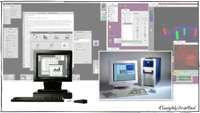
1990-1995: NeXT, Be, and the Mac PC
Apple worked to compete with clean, new platform designs from NeXT and Be, while also struggling to deliver its own future plans.
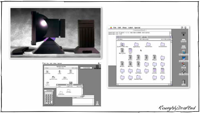
Throughout the second half of the 80's, Apple had shipped five new major versions of the Mac System Software; by 1990, the company was at System 6. After an initial flurry of rapid development, the Mac platform hit a wall. As the Mac morphed from a simple appliance computer into a new role in a more complex, networked world, it began to rise into competition with the low end of Unix workstations built by vendors such as Sun, SGI, and Apollo.

More Secrets: The Scandal of Green Computing
When I began writing the Apple and the Media series, I expected to find lots of examples of companies, individuals, and journalists suing Apple or otherwise using the company’s name for a free ride. I didn’t expect to uncover a conspiracy of greed, blackmail, protection money, and other mob tactics hiding under the sheep’s clothing of environmentalism.

1990-1995: The Race to Deliver The Next New Platform
Here's a look at rival efforts to usher in a new computing platform in the early 1990's. IBM's OS/2 partnership with Microsoft intended to replace DOS with an advanced new PC software platform, while Microsoft’s own Windows hoped to prevent competition with other existing DOS vendors. The partners struggled to maintain control while faced with external competition and internal rivalry.

Top Secret: Greenpeace Report Misleading and Incompetent
Greenpeace recently released their "Guide to Greener Electronics," rating fourteen consumer electronics vendors. Following in the same tradition as the Silicon Valley Toxics Coalition, Greenpeace issued a press release that specifically called attention to Apple and assigned the company a failing grade. Do the claims have any merit?

The SVTC’s “Toxic Trash” Attack on Apple
In 2005, the Silicon Valley Toxics Coalition targeted MacWorld, Apple's stockholder meeting, and other events to criticize the company's position on recycling and takeback programs for used computers. Here’s a look at the validity and competence of SVTC’s claims.
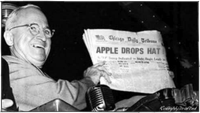
Since its first splash on the newly emerging computing scene in the late 70's, Apple has always managed to maintain a special status with the media, who quickly realized that putting an Apple related headline on a front page dramatically increased readership.
1985-1990: 16-bit Graphical Computing
Apple's Macintosh introduced a new wave of computing technology built upon the Motorola 68000 processor and a sharp, high quality graphic display.
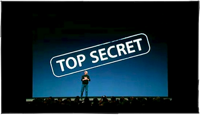
Apple has long been notoriously secretive about its unreleased products. Critics compare Apple's secrecy against the transparent development efforts of open source projects, and even with other commercial developers. Microsoft, for example, has a history of providing detailed roadmaps of future plans. Why does Apple keep its future plans under wraps?
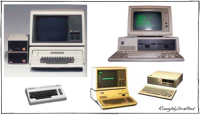
It's important to remember that there is more than one way to maintain a successful platform. Realistically, most upstart competitors realized they had no chance of entirely supplanting the entrenched systems of the time. Most sought to provide alternatives that intended to coexist among a variety of other systems.
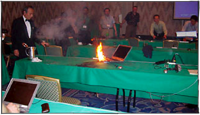
Dell and Apple recently announced recalls of 5 million Sony laptop batteries. The recall was prompted by safety issues caused by batteries melting, and in some cases, even catching on fire. While the incidents aren't widespread, the very real danger posed by laptop batteries unpredictably catching on fire has consumers worried.

Competition is a good thing. As more players enter a market, competition spurs innovation, which results in better products delivered at greater efficiency. But if that's the case, why don't we see more competition in the commercial operating system market?
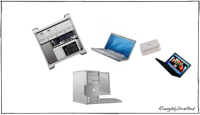
How Apple’s Firmware Leapfrogs BIOS PCs
Apple has leapt a generation ahead of other PC makers in adopting Intel's modern EFI in its new new Intel Macs. An earlier article, Imaging MacBooks: Understanding MBR, APM, & GPT, introduced the idea of what's different between the BIOS in today's PCs and the new EFI in tomorrow's. Here's a more in depth look at what these differences mean, particularly for users of interested in using Apple hardware to run both Mac OS X and Windows.

The previous article, An Introduction to Boot Camp, explained what Boot Camp is and how it differs from Parallels. Here's an overview of how Boot Camp works, and an introduction to disk formatting and the new issues introduced by EFI, Intel's new firmware used in this year's Macs.

I previously introduced a project to roll out MacBooks as standard Windows laptops in Do MacBooks Make Business Sense as PC Laptops? Since Windows is 5x More Expensive than Mac OS X, why would anyone want to run Windows on a MacBook? Well in many cases, the decision to run Windows has already been made; here's how to make lemonade!
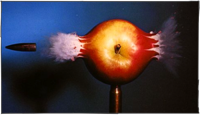
Bloggers In Blind Rage Over Digg Front Page Article
An article based on information published by Consumer Reports and the Gartner Group was brutally attacked by a wide swath of bloggers who didn't like the facts it presented. It turned out that despite all their dramatic blog rage, they weren't even exactly sure what it was about the story that got them so upset.

Windows 5x More Expensive than Mac OS X
How much does it cost to maintain Windows and Mac OS X? Since Apple has released five times as many major updates and over fifteen times as many minor updates to Mac OS X since 2000, you might not have guessed that Windows actually costs users five times as much to keep up to date!
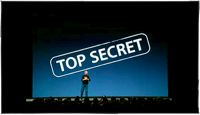
Top Secret Leopard Features Unleashed!
Nothing is more tantalizing than being left with a cliffhanger. Apple has capitalized on this to create anticipation for the top secret features yet to be announced for Leopard. What are they?
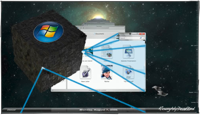
According to proponents of this myth, Apple's new Time Machine is blatant rip off of Microsoft's Volume Shadow Copy, and by extension, nothing in Leopard is interesting at all because it's all been done before. They're wrong, here's why.
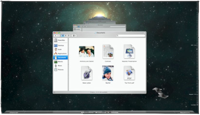
WWDC Secrets Paul Thurrott Hopes You Miss
Microsoft apologist Paul Thurrott is doing his very best to scribble up a negative spin on Apple's WWDC Leopard announcements. Poor Paul! After five years of Longhorn waiting and regular Vista disappointments, his very best attempts at poo-pooing Leopard sound a lot like sour grapes.
In the previous article, Three Reasons Why Microsoft Can't Ship (and Apple can), I described why Thurrott is so bitter about Leopard: Apple has been shipping so much innovation while Microsoft struggles to deliver any! Here's a look at the real secrets behind Leopard that Thurrott doesn't want you to notice.

Three Reasons Why Microsoft Can't Ship (and Apple can)
Microsoft apologist Paul Thurott is doing his very best to scribble up a negative spin on Apple's WWDC Leopard announcements. Poor Paul! After five years of Longhorn waiting and regular Vista disappointments, his very best attempts at poo-pooing Leopard sound a lot like sour grapes. Why is Apple shipping so much innovation while Microsoft struggles to deliver any at all?

WWDC Leopard Sneak Peek Highlights
Steve Jobs revealed a first glimpse of new Mac OS X 10.5 Leopard features in the WWDC opening keynote address. There are additional details and movies illustrating Leopard and Leopard Server features on Apple's site. Many new features delivered on my wishlist items! Here are some highlights and observations.

WWDC Leopard Server Sneak Peek Highlights
Steve Jobs revealed a first glimpse of new Mac OS X 10.5 Leopard features in WWDC opening keynote address. There are additional details and movies illustrating Leopard and Leopard Server features on Apple's site. Here are some highlights and observations.

Leopard Predictions for WWDC 2006
What will Apple announce at WWDC06? There will no doubt be some surprises, but here are some well known inevitabilities, some reasonable possibilities for new apps, new UI, and new hardware, and a few commonly repeated ideas that - sorry - have no chance!

How to Fix the Finder 3: Prettier
The Finder uses a number of graphic effects to reinforce behaviors. A third aspect of fixing the Finder makes it prettier, not by just adding fluff and eye candy, but employing intuitive user interface devices that make sense, enhance utility, and look good too. Here are some examples.
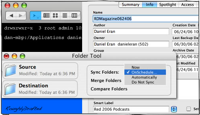
How to Fix the Finder 2: Smarter
Part one of How to Fix the Finder looked at ways to make it faster. The second aspect of fixing the Finder involves making it smarter, by presenting additional simple tools to perform complex tasks. Here are some examples
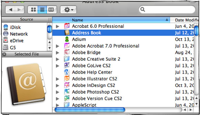
How to Fix the Finder 1: Faster
The Mac OS X Finder is at the top of everyone's fix-it list. Here's a look at what's wrong with the Finder, and ideas for fixing it.
The original Mac Finder did its job so well that few people thought of it as an application. Back then, the Finder was the system. Throughout Apple's decade of decline after the release of System 7 in 1991, the Finder only saw some minor improvements, many of which were ideas Apple borrowed from shareware tools.

Secrets of Pay Per Click Advertising
In part one, Secrets of Running a Website, I introduced my background in running various websites. Here in part two, I’ll look at how advertising works, starting with pay per click programs like Google AdSense, AdBrite, and Yahoo! Ads.
You might be wondering what kind of massive ad revenues my site generates. It’s no MySpace, but I do drive some significant traffic. This last weekend, a popular story on market share drove 20,461 unique visitors and 35,269 page views. That means the majority of readers who came to the site were interested enough to continue looking around. What kind of bonanza of advertising revenue did I earn from all this traffic?

Are you considering setting up your own website, or just curious to know more about the inside operations of running an online presence? Here’s a secret look at the ins and outs of advertising, web site traffic, and the tools available to publish your content. First off, here's an overview of my background in developing and running websites for large organizations, corporate startups, and just for entertainment.

Killer applications fuel demand for a product by exploiting new features or efficiencies in a way that changes how the world works. Here's the next big application, and how Apple is positioned to ride the wave of new hardware sales it will bring.
Two and a half years ago, I wrote an article presenting how Apple should move their Flat Panel iMac into the future: plop three inches of Mac on the back of a Cinema Display and call it the new iMac. I also presented why the alternatives made no sense. As it turned out, I was spot on.

In The Apple Market Share Myth, I demonstrated how overall market share numbers can be used to suggest ideas that have no basis in reality. Here, I’ll look at the slippery aspect of numbers, prove that a quality share of the market can be better than a larger market share, and then compare how the definition of a market is critically important in determining how useful market share numbers are. In particular, I’ll look at the iPod’s market share.
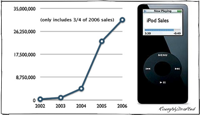
According to proponents of this myth, a vendor’s market share numbers speak for themselves as a critically important factor in selecting a technology product or platform. They're wrong, here's why.

New Media and Free Market Choice
The Online Music and Media Rental Myth introduced the two extremes in viewpoint on intellectual property rights: the media producers who think their content is worth any price they can ask, and the peanut gallery that thinks anything in the digital medium should be free.
Here in part two, I’ll consider five examples that prove that intellectual property, while offering some new challenges, still obeys the same market laws of supply and demand. Along the way, I'll also prove why the market has rejected digital media rentals.

The Online Music and Movie Rental Myth
According to proponents of this myth, the real road to obscene profits in movies, music, software, and other digital media lies with online subscription rentals, not direct sales. They're wrong, here's why.
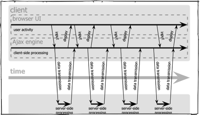
How to Build a Free and Simple Ajax Menu
Here’s a free way to add a simple, Ajax enabled menu to your site. I’m using iWeb, but it doesn’t matter what tool you use to publish your web pages. It just uses a simple collection of Javascripts to reference HTML files.
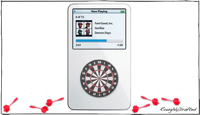
CNET's Charles Cooper Strikes Out in iPod Attack
There’s a common misconception about what it means to be proprietary. Here’s a disassembly of one of the worst articles yet on the subject, written by CNET's executive editor, Charles Cooper.

The iPod turns five years old this fall, and is due for its annual revamping. Apple keeps a tight lid on future plans, but here's a look at three designs for Generation 6 iPods, along with three software features I’d like to see Apple deliver.

The Microsoft iPod-Killer Myth
According to proponents of this myth, Microsoft is out to kill Apple's iPod with a player they will design and build on their own. Once it arrives, they expect Microsoft to clean up not only the music player market, but also online music sales, leaving Apple on the sidelines. They're wrong, here's why.
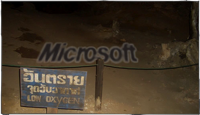
The Microsoft Invincibility Myth
According to proponents of this myth, Microsoft's expertise in building software platforms ensures that everything that Microsoft does will turn to gold. This supposed invincibility is used to prove how Microsoft will eventually dominate all new markets, from online music stores to the iPod, and how advances by Linux and Apple's Mac OS X will never make any significant impact on PC desktops. They're wrong, here's why.

Using iSight as a Hand Gesture Input Device
Apple has included simple hardware features on their laptops that have found new and different applications in the minds of users. Here are two enabling technologies that made news recently, along with an idea I'd like to see inspired by the movie Minority Report and the Sony EyeToy.

The Road to VoIP: Paved with Bad Intentions
The road to open standards is often a long, rough path. Developers of new technologies consistently aim to own and control networks, protocols, and customers, leaving their users to suffer until more open alternatives arrive. This familiar story repeated itself in email, in instant messaging, and is now playing out in the world of VoIP. Here's what happened then, and what's similarly happening now.
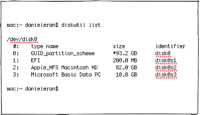
Imaging MacBooks: Understanding MBR, APM, & GPT
I introduced an experimental project to replace a fleet of PC laptops with MacBooks in Do MacBooks Make Business Sense as PC Laptops? It turns out that MacBooks do make pretty decent Windows laptops at a good price. The fatal flaw I ran into wasn't a limitation in the MacBook however; it related to the partition map used in Intel's new EFI firmware.
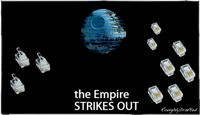
The Road to VoIP: The Empire Strikes Out
The old phone industry is, predictably, slow, conservative, and old-fashioned in everything they do. Efforts to introduce modern technologies have been hampered by fears of losing their secure existence as a monopoly, and instead be forced to compete with opportunists in profitable markets, while still being held responsible to bankroll unprofitable ventures for the public good.
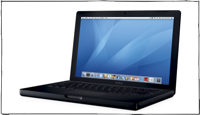
Do MacBooks Make Business Sense as PC Laptops?
One of my clients found themselves overdue for ordering new PC laptops for their business, but were out of options: the Dell Latitudes they'd bought over the last five years had not held up well, and the HP laptops they bought more recently couldn't accommodate reasonable upgrades and were heavy and unpopular with users.

Open Source Values & the Peanut Gallery
In BSD & GPL: Different Sources for Different Horses, I presented differences in two styles of open source development. Here, I'll examine the value proposition involved in choosing an open source strategy, and roast an emerging peanut gallery who are attempting to hijack and betray the free software movement.
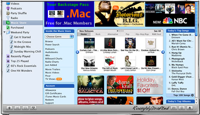
Fixing .Mac - Idea 8: Subscription Music
Apple's nebulous .Mac services were introduced in What the Heck is .Mac? In 10 Reasons Why Apple Can Kickstart Web 2.0, I presented why Apple is uniquely positioned to actually deliver .Mac services well worth the price of admission. In this series, I'll describe features I think Apple needs to add to move .Mac from "web hosting and email plus" to a complete suite of services that are valuable, obvious, and will sell themselves to potential subscribers. Plus, I want to use them!
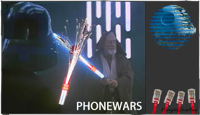
The Plain Old Telephone System. The century old telephone system is fantastically simple on the user end: it sends an analog signals over two wires, much like an electric can on a string. At the phone company's end, technology has progressively improved, with the manual switchboards and bundles of copper wires being replaced with automated digital switching equipment routing calls over fiber optic conduits.

BSD & GPL: Different Sources for Different Horses
Grumpy, conservative business analysts get riled up about Apple legendary secrecy, and demand that the company publish better technology roadmaps and provide more detailed financial information about their operations, while long-haired hippies chant about free and open development, and stage sit-ins against Apple's cautiously opened, and often tightly closed, software projects.

Apple could apply a number of the iPod's outstanding design features in a new phone that would make a good, competitive phone, and then sell customers both a good phone, and a good music player. Some of the potential risks in trying to sell their own phone might be mitigated now that Apple has a strong retail store presence, but other challenges are still out there.
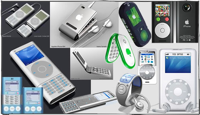
Consider the features that make the iPod competitive as a music player: its simple and elegant design, compact size, light weight, high audio quality, large storage capacity, and competitive price. Now, make it a phone.
An iPod with mobile phone features would require mobile and bluetooth radio circuity and dialing controls. Those additions would make the iPod phone more complex, bulkier, shorten its battery life, and make it more expensive. Such a device might be a better compromise than a phone trying to be a music player, but it would still compete poorly against standalone music players or dedicated phones.
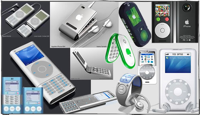
Why Mobile Phones Make Bad iPods
The previous article, The iPod Phone Myth, took apart the idea that mobile phones, and in particular smartphones, are a threat to Apple's iPod. Will that change in the near future? How much overlap is there between mobile phones and music players? In this article, I present why mobile phones and music players are not the obvious match many analysts are describing.

Fixing .Mac - Idea 7: Enhance & Encourage Sharing
Apple's nebulous .Mac services were introduced in What the Heck is .Mac? In 10 Reasons Why Apple Can Kickstart Web 2.0, I presented why Apple is uniquely positioned to actually deliver .Mac services well worth the price of admission. In this series, I'll describe features I think Apple needs to add to move .Mac from "web hosting and email plus" to a complete suite of services that are valuable, obvious, and will sell themselves to potential subscribers. Plus, I want to use them!
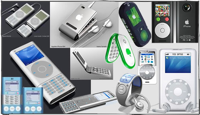
According to proponents of this myth, Apple's success with the iPod is about to be crushed by an onslaught of music playing cell phones, so Apple needs to desperately come up with an iPod + cell phone combination of their own to remain relevant. They're wrong, here's why

The Revolution Will be Open Sourced!
Over the last decade, every player in the software development industry has been dramatically affected by an open source revolution. Microsoft, once an imposing and bulletproof monopolist who led the PC industry around on a short leash, has been forced into a defensive position with its server products as Linux advances.

Fixing .Mac - Idea 6: Add Privacy Management
Apple's nebulous .Mac services were introduced in What the Heck is .Mac? In 10 Reasons Why Apple Can Kickstart Web 2.0, I presented why Apple is uniquely positioned to actually deliver .Mac services well worth the price of admission. In this series, I'll describe features I think Apple needs to add to move .Mac from "web hosting and email plus" to a complete suite of services that are valuable, obvious, and will sell themselves to potential subscribers. Plus, I want to use them!
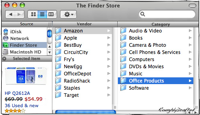
Fixing .Mac - Idea 5: A .Mac Marketplace
Apple's nebulous .Mac services were introduced in What the Heck is .Mac? In 10 Reasons Why Apple Can Kickstart Web 2.0, I presented why Apple is uniquely positioned to actually deliver .Mac services well worth the price of admission. In this series, I'll describe features I think Apple needs to add to move .Mac from "web hosting and email plus" to a complete suite of services that are valuable, obvious, and will sell themselves to potential subscribers. Plus, I want to use them!

Stevenson Fails 'Report Card' on Mac Ads
Seth Stevenson writes a column for Salon called the "Ad Report Card," where he rates the effectiveness of advertising based on his own extemporaneous criteria. Sometimes it's the concept , sometimes execution, and sometimes he just likes ads because they are entertaining. After watching Apple's new Get a Mac ads, however, he complained:
"They are conceptually brilliant, beautifully executed, and highly entertaining. But they don't make me want to buy a Mac."
Advertising isn't supposed to make you think you want to buy the product; it is designed to create awareness and results. That subtle difference is something an ad critic should understand, so Stevenson fails the grade.

Fixing .Mac - Idea 4: Secure Identity Services
Apple's nebulous .Mac services were introduced in What the Heck is .Mac? In 10 Reasons Why Apple Can Kickstart Web 2.0, I presented why Apple is uniquely positioned to actually deliver .Mac services well worth the price of admission. In this series, I'll describe features I think Apple needs to add to move .Mac from "web hosting and email plus" to a complete suite of services that are valuable, obvious, and will sell themselves to potential subscribers. Plus, I want to use them!

Apple & Open Source... Strange Buffaloes?
In "The 'Mac OS X Closed by Pirates' Myth," I took apart the idea that Apple was backpedaling on their open source efforts because of fears of piracy. The article prompted a fierce reaction from certain open source advocates, who ignored the point I was making in order to profess their devout, fundamentalist faith in the world conquering manifesto of the open source revolution. Part of that faith requires vilifying any who dare defend the release of any binary code without its accompanying source.
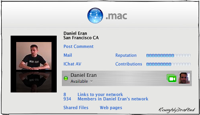
Fixing .Mac - Idea 3: .Macster!
Apple's nebulous .Mac services were introduced in What the Heck is .Mac? In 10 Reasons Why Apple Can Kickstart Web 2.0, I presented why Apple is uniquely positioned to actually deliver .Mac services well worth the price of admission. In this series, I'll describe features I think Apple needs to add to move .Mac from "web hosting and email plus" to a complete suite of services that are valuable, obvious, and will sell themselves to potential subscribers. Plus, I want to use them!
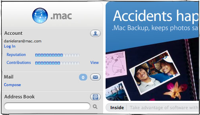
Fixing .Mac - Idea 2: A Reputation System
Apple's nebulous .Mac services were introduced in What the Heck is .Mac? In 10 Reasons Why Apple Can Kickstart Web 2.0, I presented why Apple is uniquely positioned to actually deliver .Mac services well worth the price of admission. In this series, I'll describe features I think Apple needs to add to move .Mac from "web hosting and email plus" to a complete suite of services that are valuable, obvious, and will sell themselves to potential subscribers. Plus, I want to use them!
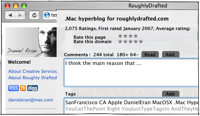
Fixing .Mac - Idea 1: Hyperblog the Web
Apple's nebulous .Mac services were introduced in What the Heck is .Mac? In 10 Reasons Why Apple Can Kickstart Web 2.0, I presented why Apple is uniquely positioned to actually deliver .Mac services well worth the price of admission. In this series, I'll describe features I think Apple needs to add to move .Mac from "web hosting and email plus" to a complete suite of services that are valuable, obvious, and will sell themselves to potential subscribers. Plus, I want to use them!
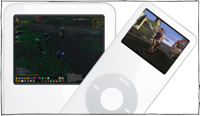
The Apple Video Game Development Myth
According to proponents of this myth, Apple's recent recruiting for video game developers means that the company is planning a big new push into video games for the Mac, the iPod, and possibly a brand new gaming console from Apple. They're wrong, here's why.

5 More Reasons Apple Can Kickstart Web 2.0
In 10 Reasons Why Apple Can Kickstart Web 2.0, I Introduced the first five reasons why Apple is a force to be reckoned with on the new web, and how this will enable them to do things other industry players can’t. Here’s five more reasons:

The 'Mac OS X Closed by Pirates' Myth
According to the proponents of this myth, Apple has abandoned their open source initiatives as they move to Intel, because they are afraid that, armed with the Darwin source code, pirate 3lit3 haxx0rs will p0wn them and have Mac OS X running on generic PCs. They're wrong, here's why.

10 Reasons Why Apple Can Kickstart Web 2.0
Apple's nebulous .Mac services were introduced in What the Heck is .Mac? Here, I'll present why Apple is uniquely poised to jump into the Web 2.0 brouhaha and deliver services worth the price of admission.
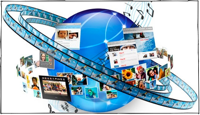
Nearly four years after its initial release, it's still hard to succinctly describe exactly what .Mac offers. Apple describes the service on their software page as a way to publish content, backup files and sync data. Interestingly, .Mac's most obvious component, email, is listed as a minor aside halfway down on .Mac features page. Clearly, Apple sees .Mac as something more than just an glorified email account.
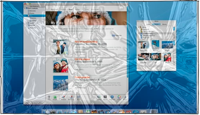
What's Broken in iWeb: A Wishlist
When Apple announced iWeb, I was seriously impressed. Rather than being a utilitarian HTML editor, they delivered a website tool that simply did seemingly everything, and a few more things, too. It was more than I was expecting.
Sometimes, after getting exactly what you want, you realize you really want something different. The good news is that iWeb 1.0 is a great start, and its problems should be easy for Apple to address.
Introducing iWeb presented the new iLife application as a novel approach to publishing web content for people who have no interest in messing around with HTML code. Like Pages, iWeb is template driven to the core. Templates provide a lot of iWeb's unique brand of utility, but also are the basis for the app’s most frustrating limitations.
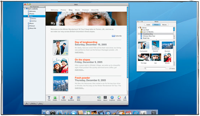
In Dr. Strangeweb, I presented why the web is fundamentally challenging to use as a medium for rich presentation. This is particularly the case for people who want to publish information without becoming experts in the web’s underlying technologies. How does iWeb compare with existing ways to manage a website?

Dr. Strangeweb: Or, How I Learned to Stop Worrying and Love the Blog
Back before Tim Berners-Lee developed the origins of the World Wide Web, Internet pioneers used ftp to get documents, Archie look up the various ftp servers, Gopher to browse for documents on remote servers in a folder like hierarchy, and Veronica and Jughead to index Gopher servers.
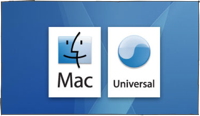
Universal Applications: How the transition to Intel is very different than the move to PowerPC
As noted in Why Apple Hasn't used Intel Processors Before, the Classic Mac OS was closely tied to the Motorola 68k processor. In the mid 90s, Apple's move to PowerPC hinged on the ability of PowerPC chips to emulate 68k code. That emulation burden was a necessary evil because so much Mac software, including Apple's own, was tied to a processor-dependent foundation.
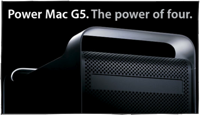
Unraveling The PowerPC Obsolescence Myth
According to proponents of this myth, Apple and third party developers will soon stop making software that runs on PowerPC Macs; even Leopard, the next release of Mac OS X, will be Intel only! They're wrong, here's why.
By Quarter: Newest Articles | Q2 2007 | Q1 2007 | Q4 2006 | Q3 2006 | Q2 2006 - 2004 | tiexp 2001
